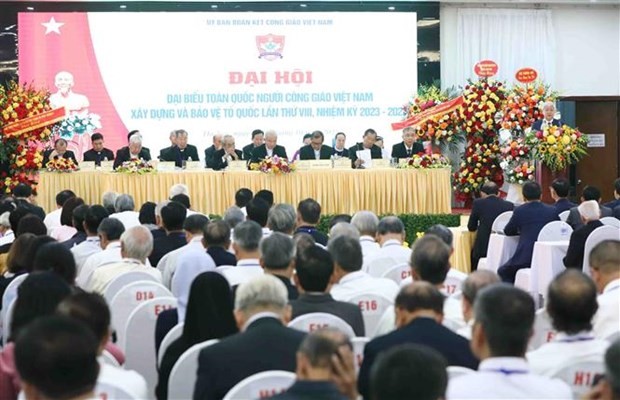(VOVWORLD) - The 8th Congress of Vietnamese Catholics on national construction and defense opened in Hanoi on Thursday. The event demonstrates the Vietnamese Party and State’s policy of freedom of religion and belief and national unity. The Communist Party of Vietnam has always considered religion a spiritual need of the people. Vietnam’s consistent views on freedom of belief and religion are reflected in the legal system.
 The 8th Congress of Vietnamese Catholics on national construction and defense opened in Hanoi on October 12, 2023 (Photo: VNA) The 8th Congress of Vietnamese Catholics on national construction and defense opened in Hanoi on October 12, 2023 (Photo: VNA) |
Throughout national development, and especially since national renewal, the Communist Party of Vietnam has issued many directives and resolutions ensuring people’s freedom of belief and religion.
They include Party Resolution 25, adopted in 2003, on religious affairs in the new situation. The Resolution clearly states that “the goal of achieving a wealthy people, a strong country, and an equitable, democratic, and civilized society is the common goal of people of all religions.
All citizens, regardless of belief or religion, have the right and obligation to build and protect the Fatherland.”
Vietnam’s laws and policies on freedom of belief and religion
During the last 20 years Vietnam has adopted more than 30 legal documents regulating belief and religious activities or amended regulations on freedom of belief and religion. These include Ordinance 21, adopted in 2004, governing belief and religious activities, Decree 22, adopted in 2005, guiding the implementation of a number of articles of the Ordinance on Belief and Religion, and Directive 1940, issued in 2008, on real estate related to religion. Most notable is Article 24 of the 2013 Constitution, which stipulates that “Everyone has the right to freedom of belief and religion, and has the right to follow any religion or to follow no religion. All religions are equal before law. The State shall respect and protect the freedom of belief and religion. No one may violate the freedom of belief and religion, nor may anyone take advantage of a belief or religion in order to violate the law.”
The National Assembly promulgated the Law on Belief and Religion in 2016. The government issued Decree 162 in 2017 detailing a number of measures to implement the Law and Religion and Belief. The document of the 13th National Party Congress said: "It’s important to mobilize, unite, and gather religious organizations, dignitaries, and followers to live a ‘good secular life’ and make positive contributions to national development and defense, ensuring that religious organizations operate in accordance with the law and the Charter and regulations recognized by the State.”
Spokesperson for the Vietnamese Foreign Ministry Pham Thu Hang said: “As a multi-ethnic and multi-religious country with a rich religious life, Vietnam always pursues a consistent policy of respecting and ensuring people’s right to freedom of belief and religion and freedom of non-belief and non-religion, ensuring equality, non-discrimination based on religions and beliefs, and protecting the activities of religious organizations by law. This is clearly stated in the Constitution, the Law on Religion and Belief, and related legal documents, and is guaranteed and respected in practice.”
Religious activities are guaranteed in practice
The Party and State’s guidelines, policies, and laws on religions and beliefs have solved many problems posed by the practice of belief and religious activities and created a legal, stable, and favorable corridor for belief and religious activities.
In the past 20 years, the number of dignitaries, religious titles, and worshiping facilities of religions has increased significantly. As of last year, the State had recognized 43 establishments of 16 different religions with 27 million followers, 53,000 dignitaries, 135,000 religious titles, and 29,000 places of worship.
More than 8,000 religious festivals draw tens of thousands of pilgrims each year. In the last ten years, hundreds of hectares of land have been provided to build worshipping facilities. Last year, authorities at all levels granted permits to build, repair, and renovate more than 150 religious worship facilities, granted permits for religious activities to 180 groups, and issued permits for 140 publications comprising 680,000 printed copies.
Authorities have approved more than 600 people to be ordained or nominated as dignitaries and 3,200 people have been appointed or elected to positions in religious organizations. This is strong evidence that freedom of belief and religion is ensured in Vietnam.
Vietnam's guidelines and policies on beliefs and religions have strengthened the great national unity and created an environment in which religious communities can contribute to national development.
Bishop Tran Xuan Manh, Chairman of the Vietnam Catholic Solidarity Committee, said: "We encourage everyone, religious and laypeople, to contribute to national development and defense, uphold national pride, and participate in maintaining national security. We remind the younger generation to strive and engage and parishioners to participate in local affairs like donating land to build roads or contributing to scholarship and talent promotion funds."
Vietnamese people’s right to freedom of belief and religion has been concretized in constitutional principles and exercised in practice toward achieving the supreme goal of promoting the mastery of the people and their legitimate spiritual needs and contributing to making Vietnam a rich, strong, equitable, democratic, and civilized country.